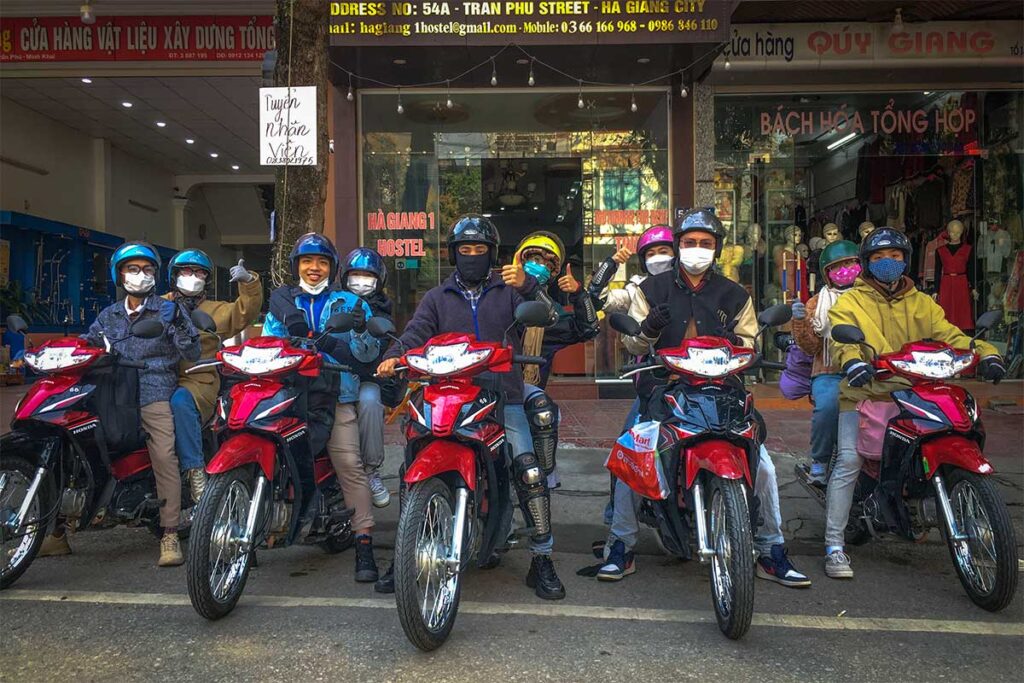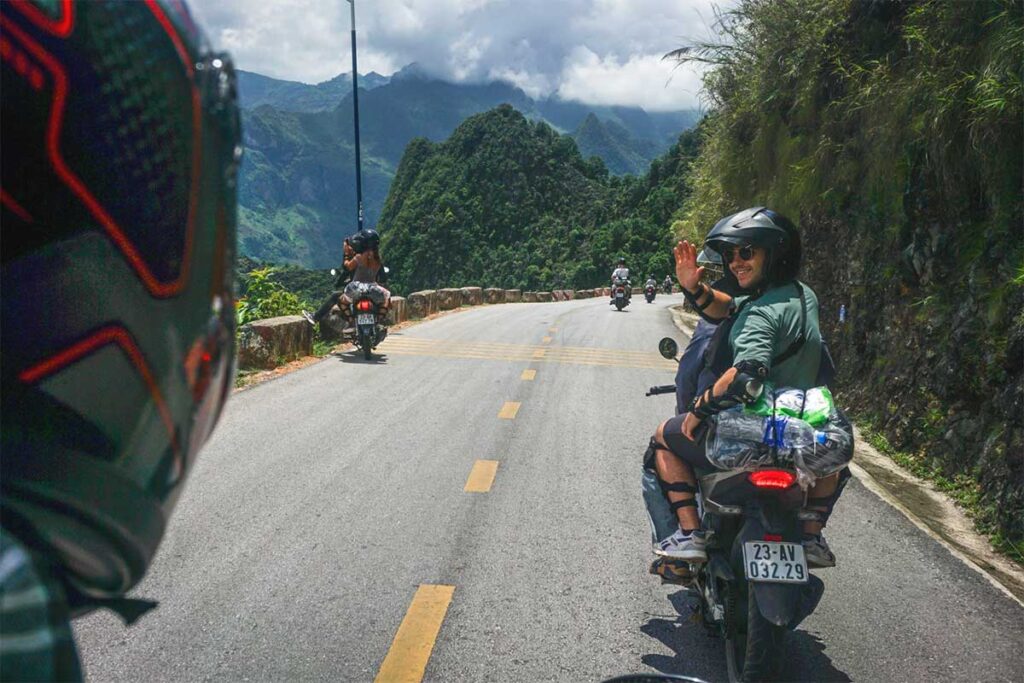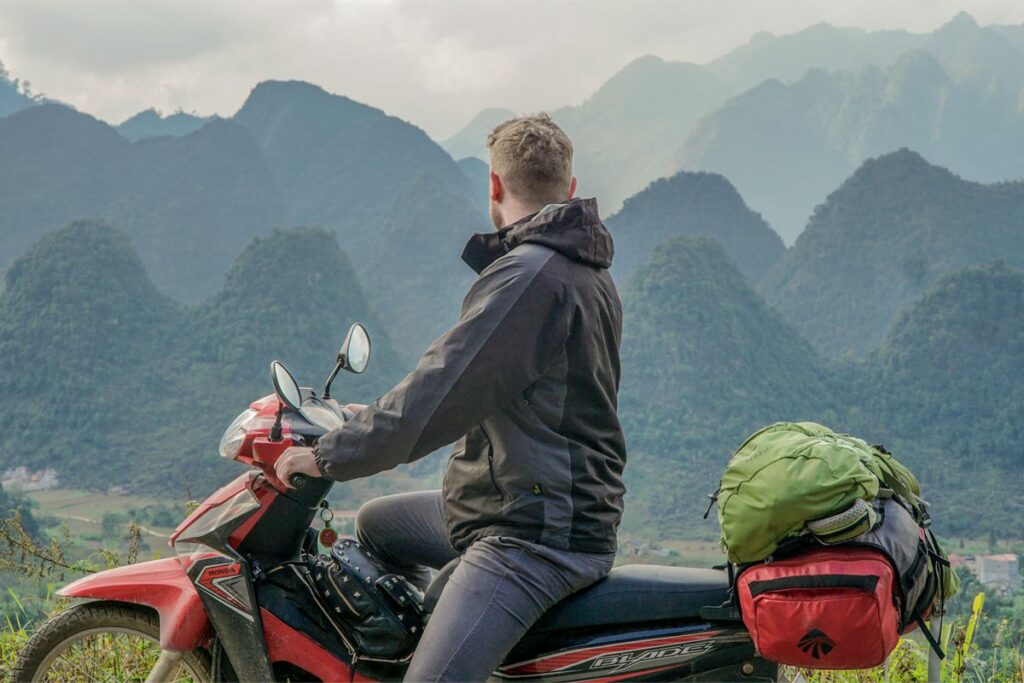Ha Giang: the start of the Loop
The Ha Giang Loop is a circular motorbike route through Vietnam’s far north, known for dramatic mountain passes, local ethnic cultures, and winding roads. The journey begins and ends in Ha Giang City, the main hub where travelers arrive and prepare.
Most travelers reach Ha Giang either very early by night bus or during the day by limousine van from Hanoi. (Tip: check our guide from Hanoi to Ha Giang for transport details.) Once you arrive, the first thing you’ll need—if you’re planning to ride—is to rent a motorbike in Ha Giang. You’ll also return to the same place at the end of your loop to drop off the bike.
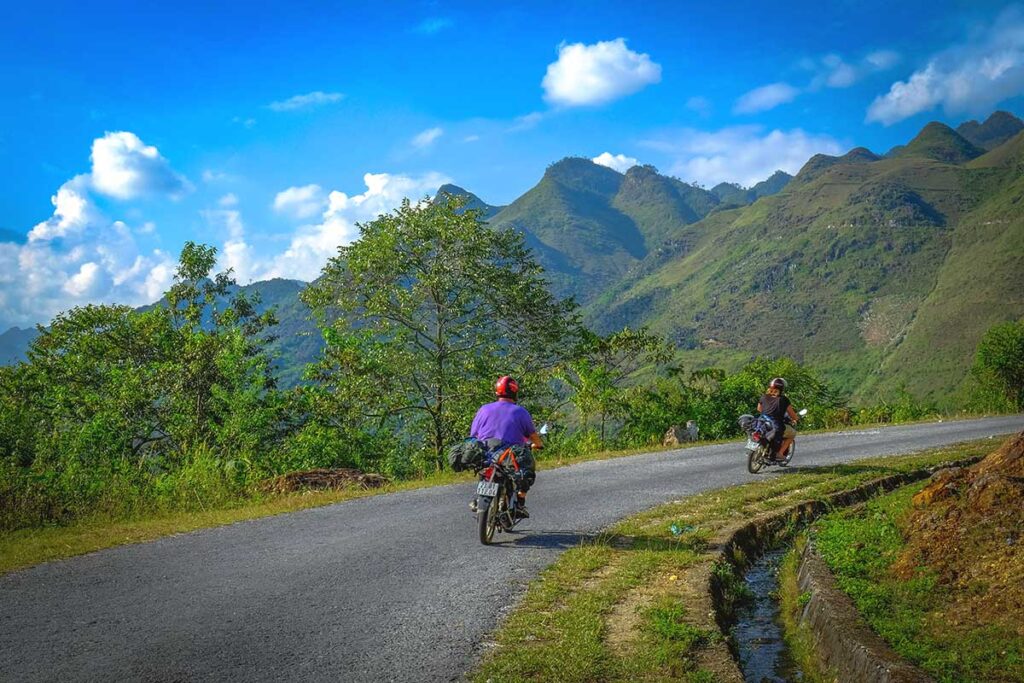
Considerations to make before renting
Renting a motorbike in Ha Giang is easy, but it’s important to make the right decision for your safety and experience. Before walking into a rental shop or booking online, keep these points in mind.
Have a valid motorbike driving licence and IDP
To legally drive in Vietnam, you need a motorbike licence from your home country and an International Driving Permit (IDP) under the 1968 convention. A car licence isn’t enough. While most rental shops don’t check this, police fines are common in Ha Giang, and more importantly—your travel insurance won’t cover you in case of an accident.
Have motorbike driving experience
Even more critical than paperwork is actual experience. The loop is beautiful, but includes steep mountain passes, sharp curves, occasional landslides, and unpredictable traffic (like buffalo). If you’ve only ever ridden a scooter in a city—or never at all—this route isn’t the place to learn.
Rent through a group tour
Many travelers who want to ride themselves still join a group motorbike tour. This isn’t about getting a better deal on the rental—it’s about safety and support. You follow a local guide at a controlled pace, avoid getting lost, and get help at tricky turns or with road conditions. It’s also easier to pass police checkpoints and stay on track with meals, fuel, and accommodation. It’s still a self-drive experience—but with much more backup.
Consider the alternative: on the back of a motorbike
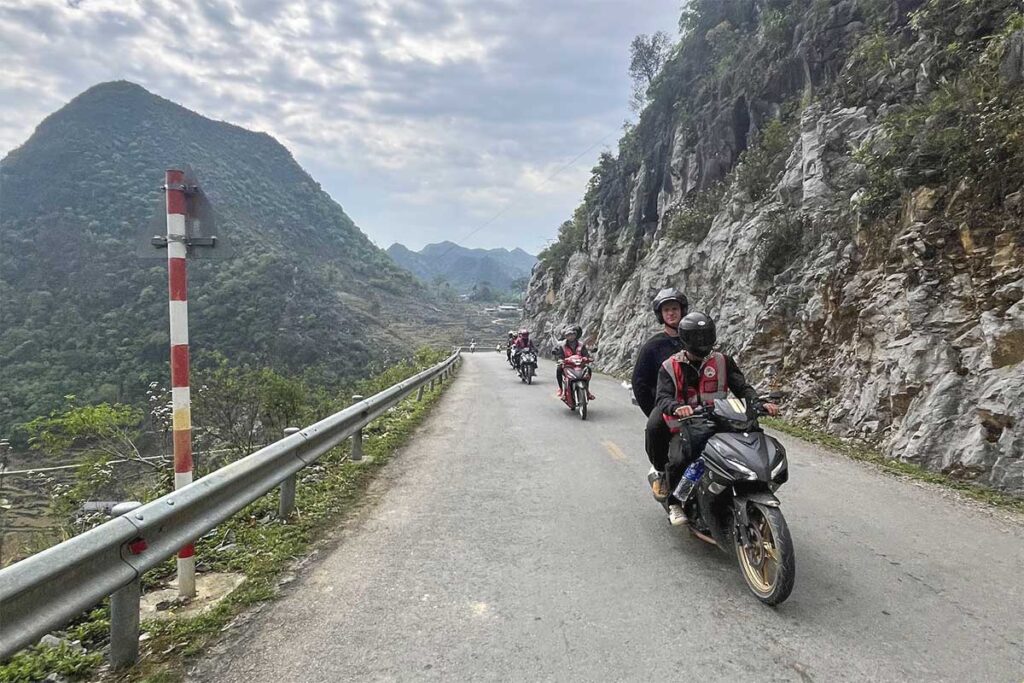
Not confident riding yourself? Then try the Ha Giang Loop by Easy Rider. You ride on the back of a motorbike with a local guide as your driver. It’s still a motorbike adventure, just without the stress of driving.
Benefits of Easy Rider tours:
- Safety – driven by an experienced local who knows the roads
- Comfort – no need to worry about police, traffic, or navigation
- Cultural insights – your guide knows the villages, markets, and stops
- Flexibility – stop for photos, food, or local stories anytime
- All arranged – transfers, accommodation, meals included
Check our full guide to Ha Giang Loop by Easy Rider.
Ha Giang Loop Tour in 3 days by Easy Rider
- Experience: Ride pillion with a local guide through Vietnam’s most dramatic mountain landscapes.
- All-Inclusive: Includes Hanoi transfers, meals, and 2 nights’ accommodation along the loop.
Where to rent a motorbike in Ha Giang?
If you’re planning to ride the Ha Giang Loop yourself, renting a motorbike is your first step after arriving. Luckily, finding one isn’t difficult—there are multiple ways to arrange your motorbike rental in Ha Giang, depending on your travel style.
Via a Ha Giang Loop tour
The most common way to rent a motorbike is as part of a guided Loop tour. Many travelers lack a licence or don’t feel confident riding solo, so they join a group that includes a guide. In this setup, the rental is arranged for you—no need to shop around. It’s a safer, easier, and more social way to ride.
While you’ll lose a bit of flexibility compared to riding completely solo, you gain a support system that includes help with navigation, police stops, accommodation, and roadside issues. For many, the peace of mind makes up for it.
Through homestays and hostels
Almost every homestay and hostel in Ha Giang offers motorbike rental, especially those catering to backpackers. These places understand that most guests are here for the Loop—so offering bikes is part of the business.
In many cases, the bikes are owned by the accommodation itself. If not, they usually partner with a Ha Giang motorbike rental shop and act as a middleman. This may add a small markup, but prices are usually still fair.
There’s no big downside to renting from your accommodation. In fact, it can be more trustworthy—bad rental experiences can affect their online reviews, so they’re often more careful.
Ha Giang motorbike rental shops
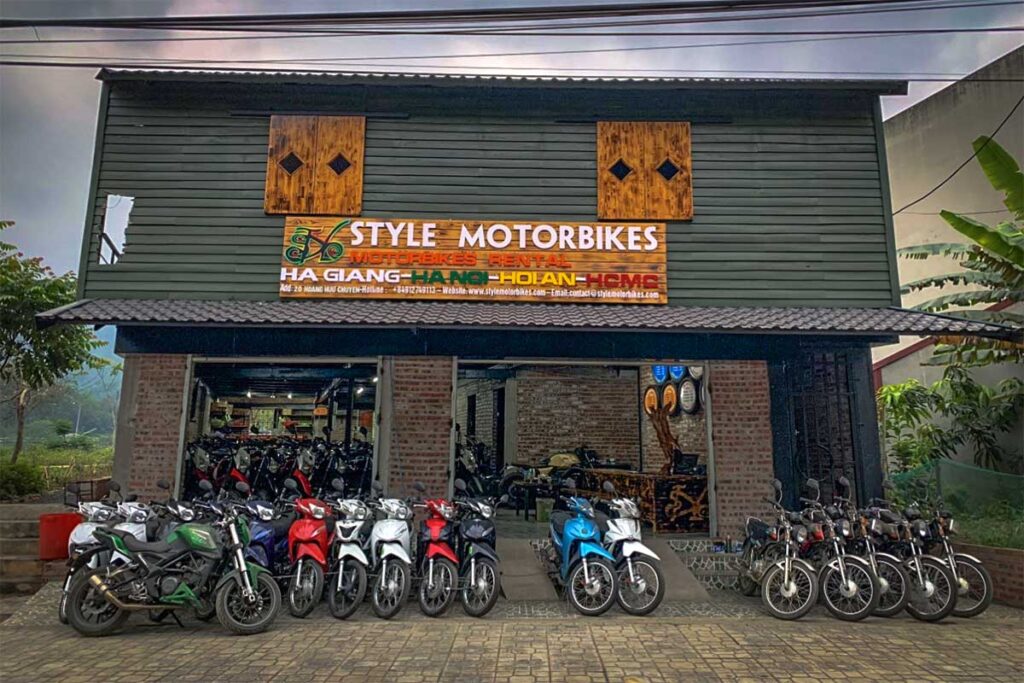
For the widest selection, head directly to a motorbike rental shop in Ha Giang. These places specialize in rentals and often have better-maintained bikes—especially if you’re looking for bigger manual bikes or off-road options.
Because of the Loop’s popularity, there’s no shortage of bikes and no need to book in advance. In fact, it’s better to visit in person to check the condition of the bike yourself. Only if you want something specific, like a big bike or off-road model, should you contact the shop ahead.
Types of motorbikes to rent in Ha Giang
Before you choose a rental, it’s important to understand the different types of bikes available. The best choice depends on your experience, comfort level, and the kind of route you plan to take.
Fully automatic scooters (not recommended)
While fully automatic scooters are common in Vietnam’s cities, they’re not suited for the Ha Giang Loop. Most have smaller engines (110–125cc) and lack engine braking, which makes downhill mountain driving more dangerous. Only consider this if you’re extremely confident and sticking to the main road in dry weather—but even then, it’s not recommended.
Typical models: Honda Air Blade, Yamaha Nouvo, Honda Lead
Semi-automatic bikes (most popular)
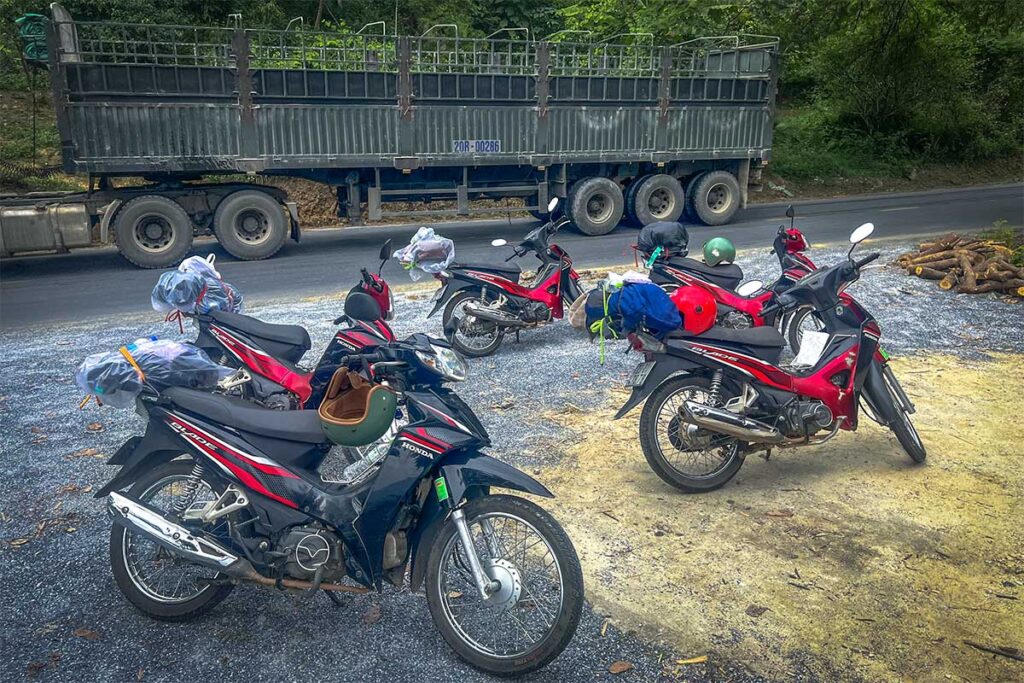
The semi-automatic is the most popular motorbike rental in Ha Giang. These 110–125cc bikes are easy to learn, have gear control without a clutch, and offer enough braking power for the mountains. They strike the right balance between ease of use and control. Ideal for beginners with some riding experience or those joining a guided group.
6.2 Semi-automatic bikes
Typical models: Honda Wave, Honda Blade, SYM Galaxy
Manual bikes (big bikes)
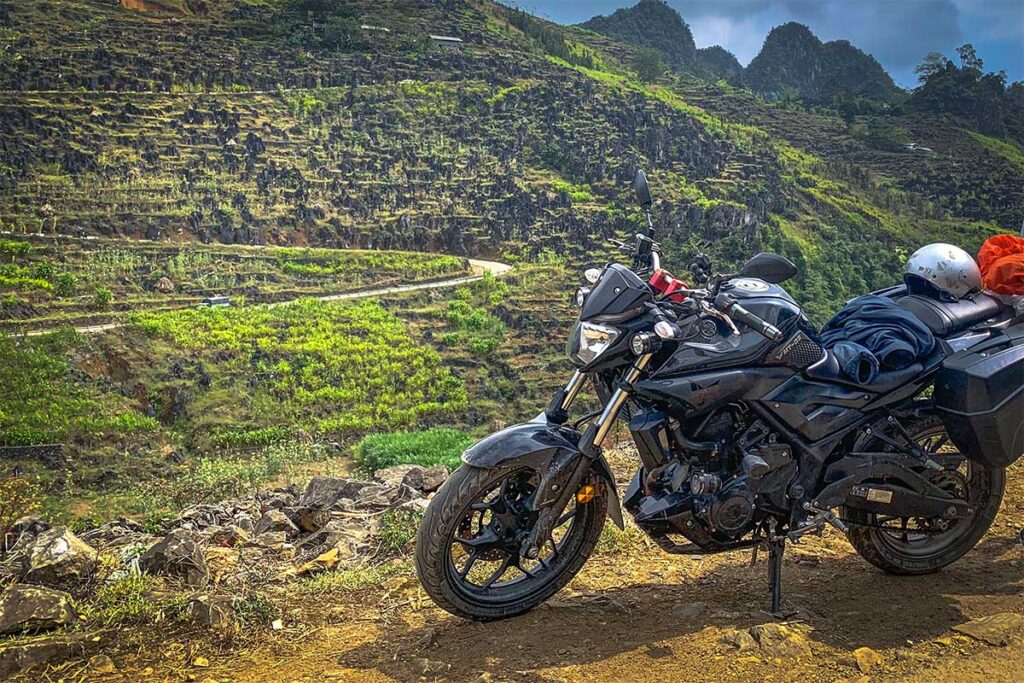
Manual bikes (usually 125–150cc or more) give you full control over the engine—better for climbs and descents. They’re best for experienced riders who are used to clutch control and want to do more adventurous or extended routes. These bikes are less commonly offered by tour operators or hostels but are available at dedicated Ha Giang motorbike rental shops.
Typical models: Honda Winner, Yamaha Exciter, Suzuki Raider
Off-road bikes
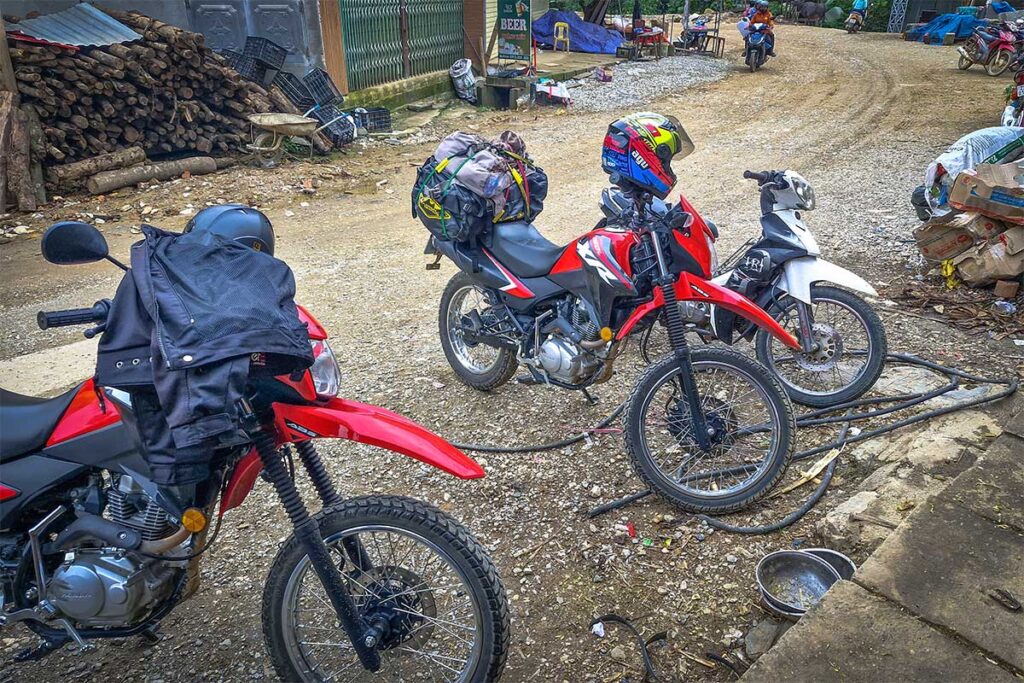
Planning to explore side routes and dirt trails? Off-road bikes offer suspension, grip, and power for unpaved conditions. Only consider this if you have strong motorbike skills and are confident handling rough terrain. Off-road models may be limited in supply, so check availability in advance if that’s your plan.
Typical models: Honda XR150, Yamaha XTZ125, Suzuki DR-Z125
Checklist for checking your motorbike
Before you head off on the Ha Giang Loop, always inspect the motorbike. Even well-reviewed rentals can have small issues. Here’s what to check—quick, simple, and worth the few extra minutes:
Brakes
Test both front and rear brakes. Push the bike slowly and brake—should stop smoothly without weird sounds or grabbing.
Tires
Look for good tread (visible grooves, not bald) and make sure they’re not flat or overly worn down. Uneven wear or cracks? Ask for another bike.
Lights & Indicators
Turn on the headlight, brake light, and all indicators. Important for tunnels and bad weather.
Horn
Essential on Vietnam’s roads. Press the horn button—if it doesn’t work, ask for a fix.
Fuel gauge & tank
Check if the fuel gauge works and how much fuel is already in the tank. Most rentals start nearly empty—ask where to fill up nearby.
Mirrors
You should have two working mirrors. Adjust them before riding off.
Throttle
Twist the throttle gently—should respond smoothly. If it sticks or feels delayed, don’t use that bike.
Chain & sprocket
Check the chain isn’t too loose or dry. It shouldn’t sag much and should be lightly greased.
Suspension
Push down on the front and rear of the bike. It should bounce slightly, not feel rock hard or overly soft.
Steering
Move the handlebars left and right. Should feel smooth, not tight or jerky.
Kickstand & center stand
Make sure it holds the bike up and springs back when you ride off.
License plate & papers
Ask to see the motorbike registration card (blue card) or rental document. Not usually checked by police, but helpful in rare cases.
Helmet condition
Ask for a proper, padded helmet—not just a cheap shell. Make sure the strap works and it fits snugly.
Tip: If anything feels off during the test ride, swap bikes. A good rental shop won’t mind. You’re about to ride mountain roads—start with peace of mind.
Insurance & deposits when renting
Renting a motorbike in Ha Giang is generally easy, but it’s important to understand how deposits, insurance, and damage policies work—especially since most rentals don’t include full coverage.
Do you need to leave a passport or deposit?
Never leave your passport as a deposit.
Some rental shops may ask, but you should always refuse. You’ll need your passport to check in at accommodations, and it’s risky to leave it behind. Reputable shops will accept a cash deposit (often around 1–3 million VND) or a photo of your passport instead.
Is insurance included?
Usually not.
Most Ha Giang motorbike rentals don’t include collision or theft insurance. Even if the bike is technically “insured,” it rarely covers damage you cause—or injury. That’s why driving without a valid license or IDP also invalidates any personal travel insurance you may have.
What if there’s damage?
If you return the bike with scratches, broken parts, or dents, the shop may charge you. Prices vary—minor cosmetic damage might cost 100,000–300,000 VND, while larger repairs can run higher.
Take photos and videos before departure.
This is your best protection. Document any existing damage (scratches, cracked mirrors, etc.) so you’re not blamed later. Also take a short video walking around the bike from all angles.
Tip: Easy Rider tours reduce your risk
If you join a Ha Giang Easy Rider tour, you’re on the back of the bike, not the one responsible for it. That means you don’t have to leave a deposit, worry about damage, or deal with repairs—it’s all handled by the guide.
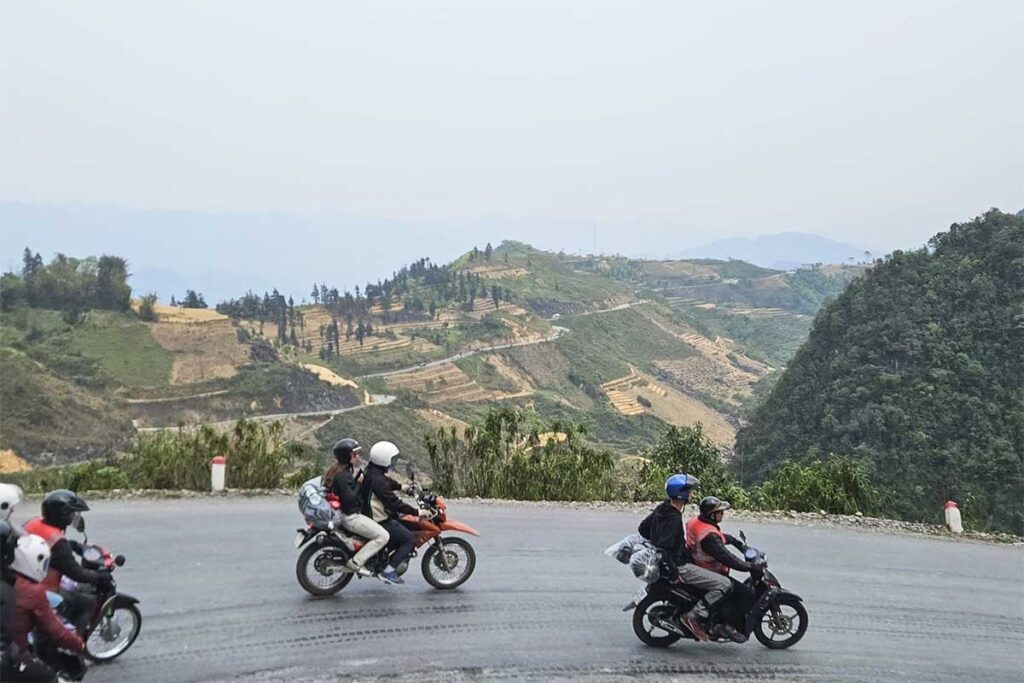
FAQ about driving your rented motorbike in Ha Giang
Do I need to refuel the motorbike myself?
Yes. Most bikes are given with little fuel to start. You’ll need to refuel early—there are gas stations in Ha Giang City and several small roadside fuel sellers along the loop. Always refuel before remote stretches, especially near mountain passes.
What happens if my motorbike breaks down?
Minor issues like flat tires or loose parts can often be fixed in local repair shops (look for signs saying “Sửa Xe”). If you rent from a reputable shop or tour company, they may also offer a hotline or support. Check this before renting.
Can I bring my luggage on the motorbike in Ha Giang?
Yes. Most motorbikes rented for the Ha Giang Loop come with a luggage rack on the back, suitable for a backpack or small suitcase. Use bungee cords or straps to secure it properly before riding.
What to do with my large luggage?
If you have bulky items like a large suitcase, you can usually leave them at your hotel in Ha Giang. Most accommodations offer free storage. Some rental shops also provide this service. If you’re returning to Hanoi, many travelers leave their big luggage there.
Is driving a motorbike safe in Ha Giang?
It depends on your experience. The roads are in decent condition, but they’re mountainous with many sharp turns. Always drive slowly, stay alert for unexpected traffic (like trucks or buffalo), and don’t overestimate your skills. Avoid riding in bad weather or after dark.
What is a common motorbike rental scam?
While Ha Giang has fewer scams than big tourist cities, the most common issue is being blamed for existing damage. Always take clear photos and videos of the bike before your trip, especially scratches or broken parts. Never leave your passport as a deposit.
